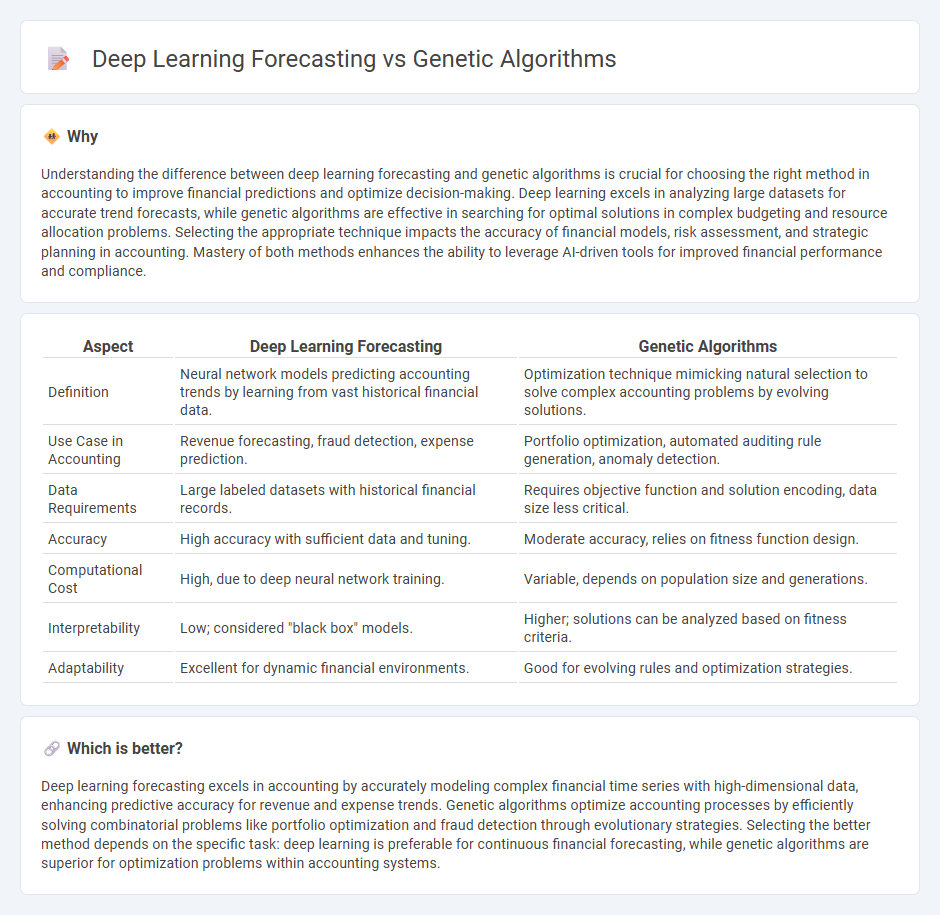
Deep learning forecasting leverages neural networks to analyze vast financial datasets, identifying complex patterns for accurate accounting predictions. Genetic algorithms mimic natural selection processes to optimize forecasting models by iteratively improving solutions based on performance metrics. Explore further to understand which approach best suits your accounting forecasting needs.
Why it is important
Understanding the difference between deep learning forecasting and genetic algorithms is crucial for choosing the right method in accounting to improve financial predictions and optimize decision-making. Deep learning excels in analyzing large datasets for accurate trend forecasts, while genetic algorithms are effective in searching for optimal solutions in complex budgeting and resource allocation problems. Selecting the appropriate technique impacts the accuracy of financial models, risk assessment, and strategic planning in accounting. Mastery of both methods enhances the ability to leverage AI-driven tools for improved financial performance and compliance.
Comparison Table
| Aspect | Deep Learning Forecasting | Genetic Algorithms |
|---|---|---|
| Definition | Neural network models predicting accounting trends by learning from vast historical financial data. | Optimization technique mimicking natural selection to solve complex accounting problems by evolving solutions. |
| Use Case in Accounting | Revenue forecasting, fraud detection, expense prediction. | Portfolio optimization, automated auditing rule generation, anomaly detection. |
| Data Requirements | Large labeled datasets with historical financial records. | Requires objective function and solution encoding, data size less critical. |
| Accuracy | High accuracy with sufficient data and tuning. | Moderate accuracy, relies on fitness function design. |
| Computational Cost | High, due to deep neural network training. | Variable, depends on population size and generations. |
| Interpretability | Low; considered "black box" models. | Higher; solutions can be analyzed based on fitness criteria. |
| Adaptability | Excellent for dynamic financial environments. | Good for evolving rules and optimization strategies. |
Which is better?
Deep learning forecasting excels in accounting by accurately modeling complex financial time series with high-dimensional data, enhancing predictive accuracy for revenue and expense trends. Genetic algorithms optimize accounting processes by efficiently solving combinatorial problems like portfolio optimization and fraud detection through evolutionary strategies. Selecting the better method depends on the specific task: deep learning is preferable for continuous financial forecasting, while genetic algorithms are superior for optimization problems within accounting systems.
Connection
Deep learning forecasting leverages neural networks to analyze complex financial patterns and predict future accounting trends with high accuracy. Genetic algorithms optimize forecasting models by selecting the most relevant features and parameters, enhancing prediction performance in accounting tasks. The integration of deep learning and genetic algorithms enables adaptive, data-driven decision-making in financial analysis and risk management.
Key Terms
Model Accuracy
Genetic algorithms optimize forecasting models by simulating natural selection to identify the best parameter sets, often excelling in complex search spaces. Deep learning forecasting leverages large datasets and neural networks to capture intricate patterns, typically achieving higher accuracy in time-series predictions. Explore detailed comparisons of model accuracy and application contexts to determine the most suitable approach for your forecasting needs.
Cost Function
Cost functions in genetic algorithms typically evaluate solutions based on fitness scores derived from error metrics such as mean squared error, guiding the evolutionary process toward optimal forecasting models. Deep learning forecasting relies on differentiable cost functions like cross-entropy or mean absolute error, enabling gradient-based optimization methods such as backpropagation for fine-tuning neural networks. Explore further to understand how these cost function mechanisms impact forecasting accuracy and model efficiency.
Time Series Data
Genetic algorithms optimize forecasting models by evolving solution parameters to handle complex time series patterns, while deep learning uses neural networks to automatically extract features and capture temporal dependencies. Deep learning models such as LSTM and CNN excel in processing large-scale sequential data for accurate predictions, whereas genetic algorithms are advantageous in parameter tuning and feature selection within diverse time series tasks. Explore detailed comparisons and use cases to understand which approach best suits your time series forecasting needs.
 dowidth.com
dowidth.com